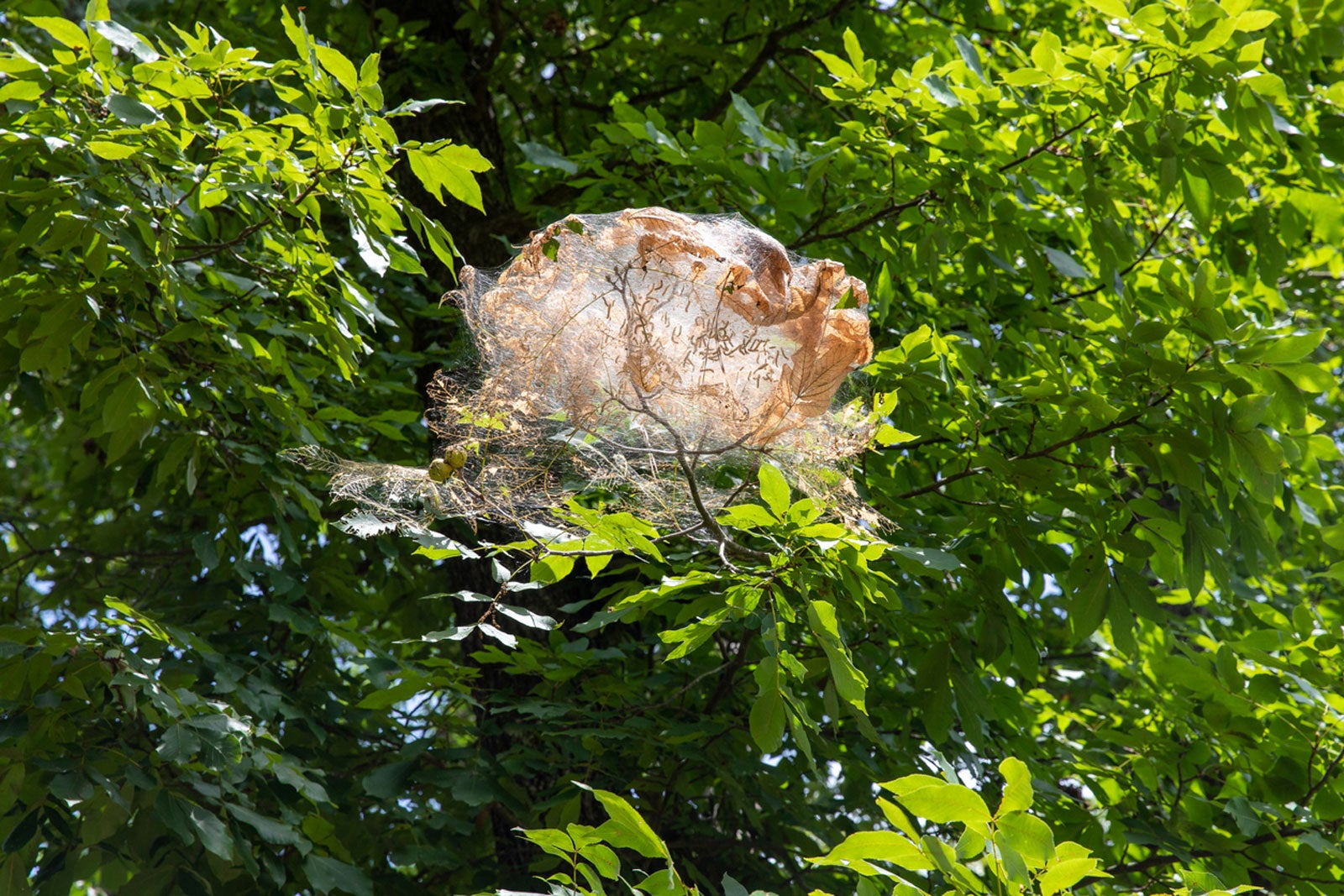
Sign up for the Gardening Know How newsletter today and receive a free copy of our e-book "How to Grow Delicious Tomatoes".
You are now subscribed
Your newsletter sign-up was successful
Many people wonder what to do about webworms. When controlling fall webworms, it's useful to analyze what exactly they are. Webworms, or Hyphantria cunea, usually appear on trees in the fall (while tent worms appear in spring), causing unsightly nests and severe leaf damage. Let's learn more about fall webworm control.
Fall Webworm Info
Webworms are caterpillars that weave loose webbing around the tree's foliage whilst munching on leaves, resulting in plant stress and leaf loss. This larval “nest” may cover single leaves or leaf clusters, but more often entire branches covering several feet (1 to 2 m.) across. Webworm treatment options have to do with the life cycle of the critter. Webworms overwinter as pupae in cocoons found in the bark of the tree or amongst leaf litter. In the spring, adults emerge and deposit eggs, often creating large numbers of these caterpillar-laden webs in a single tree. These caterpillars may go through as many as eleven growth stages (instars) before leaving the web to pupate and multiple generations occur per year. Webworm caterpillars are about an inch (2.5 cm.) long with black to reddish heads and light yellow to greenish bodies with a mottled stripe of two rows of black tubercles and tufts of long, whitish hairs. Adults appear as white moths with dark spots on their wings.
Tips for Controlling Fall Webworms
What to do about webworms? There are several schools of thought on the best way to kill webworms. Fall webworm control runs the gamut from insecticides to burning the nests. Yes, webworm treatment may extend to the lengths of burning the nests, so read on. Controlling fall webworms may be difficult due to their sheer large numbers and the variety of trees which they attack. Damage to such cultivars of hickory, mulberry, oak, pecan, poplar, redbud, sweet gum, willow, and other ornamental, fruit, and nut trees may require a specific webworm treatment as the best way to kill webworms.
What to Do About Webworms
A webworm treatment for control of fall webworms that is highly recommended is the use of dormant oil. The best way to kill webworms with dormant oil is in the early spring while the tree is dormant. Dormant oil is preferable due to its low toxicity and easy availability; any local garden supply store will have it. Dormant oil attacks and kills the overwintering eggs. The control of fall webworms also includes the more toxic varieties of insecticides, such as Sevin or Malathion. Sevin is a webworm treatment that kills the webworms once they are outside of the nest. Malathion works in much the same manner; however, it will leave a residue on the tree's foliage. Orthene is also an option for fall webworm control. And the last, but certainly not the least dramatic method, is to burn them out. Some folks utilize a propane torch attached to a long pole and burn out the webs. I can name a couple of sound reasons for the insanity of this method of fall webworm control. Controlling fall webworms via this route is dangerous due to the flaming webs one must dodge, the probability of making a conflagration of the entire tree, and not least, the difficulty in hanging onto a stepladder with a flaming 20 foot (6 m.) pole! However, to each their own. The safest and most effective method of what to do about webworms is as follows: Prune the tree in the spring and spray with a lime-sulfur and dormant oil spray. As buds begin to break, follow up your webworm treatment by spraying Sevin or Malathion and repeat in 10 days. Also, make sure to clean up any leaf debris to remove overwintering pupation populations.
Sign up for the Gardening Know How newsletter today and receive a free copy of our e-book "How to Grow Delicious Tomatoes".

Amy Grant has been gardening for 30 years and writing for 15. A professional chef and caterer, Amy's area of expertise is culinary gardening.
